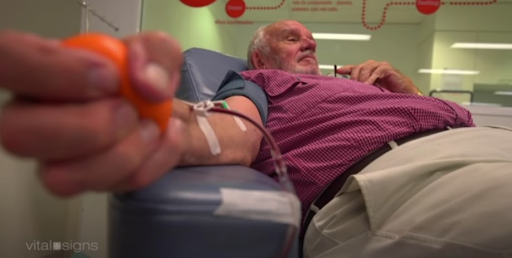Golden Blood: The Rarest Blood Type In The World

James Harrison donating his Golden Blood.
May 3, 2021
Blood transfusions are needed every two seconds in the United States, according to statistics from Red Cross Blood. These are often life-saving donations that, for most of us, we know we have available. Unfortunately, there are some that don’t have these same opportunities, and for them, life can be vastly different than our own. This is what it’s like for people with the Golden Blood Type.
According to the Australian Academy of Science, a person’s blood type is determined by the antigens, or lack thereof, located on the red blood cells. Antigens are proteins that identify and defend our body from certain bacteria. There are 35 total blood group systems but there are two major categories of antigens on the red blood cells; ABO antigens and Rh antigens. In the ABO category, one will either have A antigens, B antigens, or neither (which results in blood type O). Blood type also determines whether someone’s plasma will have a reaction when receiving other blood types. For example, B positive blood has anti-A antibodies in the plasma, meaning people with B blood cannot accept blood from an A positive or A negative donor. The Rh system has a total of 61 different antigens. However, the one most people need to worry about is the Rh D antigen. The Rh D antigen dictates whether blood type is positive or negative. If it’s positive, blood can be received from people with negative or positive blood. If there are no Rh D antigens, blood can only be received from those with Rh D negative blood. For others, though, it’s a bit more complicated.
As previously mentioned, there are 61 different Rh antigens. According to Real Science, most of us have the same sub-categories of antigens and do not need to worry when receiving blood beyond the Rh D antigen (positive/negative). However, there are certain individuals who don’t have certain Rh antigens, and if they need a transfusion, they need to be carefully screened by doctors in order to make sure their plasma will accept the blood.
The Golden Blood Type is an example of this, but instead of lacking just some Rh antigens, it lacks all 61 of the antigens, giving it the proper name of the Rh null blood type. This means it is the only true universal donor and can offer tremendous and uniquely life-saving capabilities. According to KHON2 News, in 2015 an unusually large number of babies in Australia were born with brain damage, quickly died after birth, or died in the womb. It was determined that this was caused by Rhesus Disease in which the antibodies of the mother’s blood would fight the blood type of their baby before birth. A man by the name of James Harrison was determined to give a specific antibody in his plasma that could be used to develop a vaccine to Rhesus Disease because he had Rh-null blood type. He continued to donate his Golden Blood for over 60 years, and some credited him with saving the lives of approximately two million babies. Nevertheless, having such a rare blood type also comes with risks.
There are only 43 people in the world currently who have been identified to have Golden or Rh null blood type. These 43 people can only safely accept blood from each other. This leads to complications when it comes to donating and receiving blood. Blood can typically only be stored for 42 days before becoming unusable. This means that the people with Golden blood who do donate blood have to go to special blood banks with freezers that are often in inconvenient locations and many have to donate at inconvenient times. These 43 people also don’t likely live near each other, and sending blood between countries can be complicated. Additionally, only a few people with the Golden blood type make blood donations, such as a Swiss man who publicly only goes by Thomas.
In an interview conducted by Penny Bailey, from Mosaic Science, Thomas spoke about how he had to be more careful during his life due to his extremely rare Golden blood, and when he was a kid he wasn’t allowed to go to summer camp out of his parents’ fears of a serious injury. As an adult, he exercises extreme caution when driving, and can’t go to countries without a modern hospital. Bailey also noted that when he donates blood for his own future potential needs, it must be donated first to others who need it more direly. Beyond all the inconveniences, out-of-pocket money spent on plane tickets, and life-threatening risks he has faced, Bailey still states “… I’m lucky. I’m glad also that when I was told I had this special blood, they told me it’s okay to have children. I was allowed to have a family, so I’m happy.” The aforementioned Rh null donor James Harrison said something similar, saying, “It becomes quite humbling when they say ‘oh you’ve done this or you’ve done that or you’re a hero’, no, no, no it’s just something I can do.”
Seeing Harrison and Thomas respond with such humility while doing an act most would consider heroic is humbling. Given its rarity and value, it is apparent that Golden Blood is aptly named and should be treasured accordingly.








